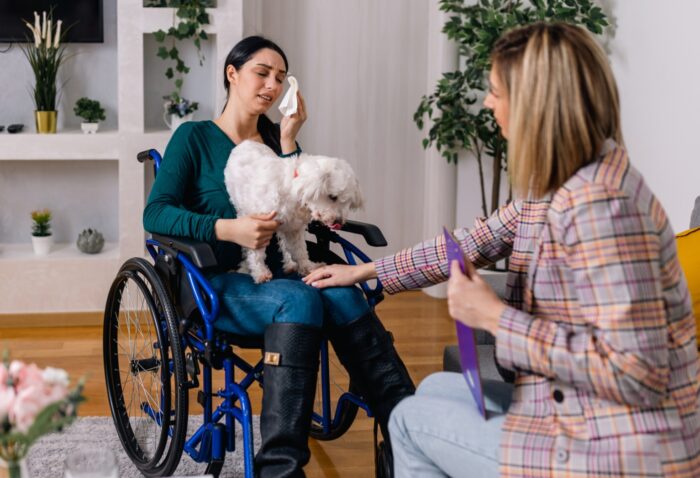
Dogs have long been considered our best friends. However, they offer much more than just companionship; they can be catalysts for healing and recovery. Canine therapy harnesses the innate bond between humans and dogs to offer significant benefits in various facets of our lives. This piece will delve into the diverse range of advantages therapy dogs bring to our mental health, emotional state, education, physical health, rehabilitation, stress reduction, trauma management, and social interaction.
Stress Reduction
For stress reduction, therapy dogs work wonders. Their presence alone can instill a feeling of calm and tranquility, offering a reprieve from daily stressors. The simple act of petting a dog has been proven to trigger a relaxation response in the human body, reducing stress hormone levels, and increasing feel-good hormones like serotonin and dopamine.
Even in high-stress work environments, therapy dogs can make a significant difference. Their calming influence can help maintain employee morale, prevent burnout, and ultimately foster a healthier, more productive workplace. Therapy dogs are not only beneficial for individuals but also contribute significantly to collective well-being. Visit Therapy Dogs for Sale in case you need help from a furry friend who will love and care for you.

Mental Health
Our first point of exploration takes us into the realm of mental health, an area where therapy dogs truly shine. Countless research studies have indicated that interaction with these four-legged friends significantly alleviates symptoms of numerous mental health disorders, including anxiety, depression, and post-traumatic stress disorder. In the presence of a therapy dog, individuals often experience a sense of calmness and security, providing a sense of ease that can be therapeutic in itself.
Struggling with cognitive decline is a harsh reality for many, particularly the elderly. These fascinating animals have proven to be valuable assets in this regard. Engagement with these compassionate creatures encourages mental stimulation and, in turn, helps to maintain or even improve cognitive function over time. In essence, the presence of a therapy dog provides a unique, non-invasive approach to mental health care, significantly enhancing the quality of life for many individuals.
Emotional Well-being
Onto our second focus area – emotional well-being. The uplifting nature of therapy dogs can be an invaluable tool in enhancing our emotional stability. People dealing with loneliness or feelings of isolation can find solace in the unconditional affection these animals provide, helping to restore a sense of belonging and purpose.
The silent, accepting nature of these pups can also facilitate emotional expression. For those who find it challenging to express feelings, a therapy dog’s companionship provides a safe, non-judgmental space to open up. Over time, this process can contribute to better emotional awareness and regulation, thus promoting emotional well-being.

Schools and Educational Settings
Bringing therapy dogs into educational contexts has remarkable benefits. An immediate impact is observed in reducing anxiety among students, especially those who might have learning disabilities or difficulty fitting in. The comfort and support these dogs provide can enhance a student’s focus and engagement, thereby improving their overall academic performance.
Therapy dogs have shown promise in encouraging positive behavior among students. By teaching children to care for these animals, educational settings can impart essential values such as empathy, responsibility, and respect. Hence, therapy dogs contribute not just to academic learning but to character development as well.
Physical Health
Transitioning now to physical health, therapy dogs play a vital role. Spending time with these animals has been shown to lower blood pressure, reduce heart rate, and mitigate the risk of heart disease. In other words, just being around them can positively influence our physical health parameters.
There is also compelling evidence that interactions with therapy dogs can stimulate the release of endorphins – the body’s natural painkillers. This is particularly beneficial for individuals managing chronic pain conditions, as it offers an alternative to traditional pain management strategies, often with remarkable results.

Rehabilitation
When it comes to rehabilitation, canines trained to help people can facilitate substantial progress. These special companions aid in regaining mobility and enhancing motor skills for individuals recovering from strokes or accidents. Tasks such as walking a dog or playing fetch can significantly improve an individual’s coordination, balance, and strength.
Another noteworthy aspect is the positive impact on medication adherence. Therapy dogs have been instrumental in fostering a sense of responsibility in individuals, encouraging them to stick to their treatment plans. A patient’s commitment to taking medication as prescribed is a crucial factor in successful rehabilitation, and these four-legged healers often inspire this commitment.
Trauma and Crisis Situations
When it comes to trauma and crises, therapy dogs play a critical role. They offer victims of traumatic events a source of comfort and stability, helping to create an environment that promotes healing. Their non-judgmental nature can make it easier for individuals to process their experiences, contributing to their overall recovery.
For those dealing with grief, therapy dogs can offer a unique form of solace. They provide a constant, comforting presence that can ease the pain of loss and facilitate the journey toward acceptance. In these ways, they play an irreplaceable role in managing trauma and crises.

Social Interaction
Therapy dogs are excellent promoters of social interaction. They can serve as social catalysts, sparking conversations and creating opportunities for human connection. This can be particularly beneficial for individuals who struggle with social anxiety or other barriers to interaction.
For those living in care homes or assisted living facilities, the companionship of therapy dogs can significantly improve social engagement. These dogs bring joy and energy that encourage residents to interact not only with the animals but also with each other, fostering a greater sense of community and connection.
Final Reflection
It is more than evident that therapy dogs hold a unique healing power. Their benefits span various facets of our lives – mental health, emotional well-being, education, physical health, rehabilitation, stress reduction, trauma management, and social interaction. Regardless of age or circumstance, we can all harness the transformative impact of therapy dogs to lead healthier, happier lives. Let this exploration serve as a testament to the healing power that lies within our loyal, four-legged friends, encouraging a greater appreciation for these remarkable creatures.











